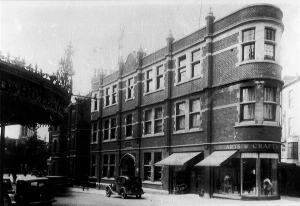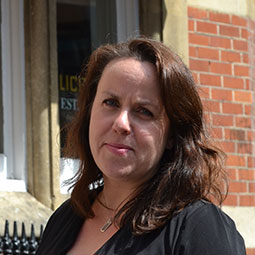Back in 1939, Bruce Brewer joined Druitts Solicitors in Bournemouth as an Office Boy, you can read a little of his working day below:
Recollections of ‘J & W H Druitt’ Solicitors by Bruce Brewer: Office Boy, Junior Clerk from 1939 to 1943
I joined the well-known firm of Solicitors on February 8th 1939, having obtained the job through the School Levers Employment Agency. I was recommended and encouraged to try for the post of Office Boy by the late Headmaster of the Alma Road School, which was destroyed by a bomb dropped by a German enemy aircraft on the night of 16th November 1940.
The qualifications for the job were the usual requirements necessary i.e. neatness in appearance, to be punctual, accurate in figures, trustworthy and must be above average in handwriting. I imagined I must have convinced one of the partners and the Chief Clerk that I was suitable for the position. I was interviewed by Mr. Geoffrey Tremenheere Druitt, the younger of the two partners and the Managing Clerk, a very formidable character by the name of Mr. Robert Trivet. This gentleman had only one arm having lost the left one during the 1914 – 1918 war. Bob Trivet as he was known gave me all the information regarding the duties and G T Druitt informed me that my wages would be 7/6d per week (37.5 new pence) for 3 months rising to 10/- (50p) if I proved satisfactory. I accepted the terms and commenced work on February 8th 1939, my first ever full employment.
I arrived at 9.00 a.m. all polished and spruced up to be introduced to the staff. I first met again Mr. G T Druitt, who was also a Major in the Territorial Army. He was a pleasant person and easy to get along with. A dapper short man drove in from Christchurch every morning in his Morris 8 car which he was always able to park right outside the office. Right opposite the offices were the prestigious Grand Hotel and Fir Vale Road was a one-way road for traffic. I did not have many contacts with G.T. except to keep his coal fire well stoked up during the winter and bring in his coffee at 10.30 every morning. (Fortunately gas fires were installed after a year or so.)
The principal partner was Mr. James Victor Druitt aged 55 plus, and along with G.T. a member of the large family of Druitts of Christchurch. He only worked half days and left each day shortly after lunch, probably to spend the afternoon at the Christchurch Sailing Club. J.V. usually dealt with the important clients at that time. Commander Hector Monroe of Edmond sham House, Cranbourne, Major Rebec of Rebecs the Estate Agents, and there was a Mr. Maclean who was corrected to the toothpaste business. There were several others whose names escape me. Comr. Monro owned a lot of property around the Terrace Road area and the block of flats built there is still known as ‘Edmondsham House’.
I started my duties at 9.15 a.m. prompt in the reception office which was also occupied by a shorthand typist, Miss Beryl Lowe. My first task was to stoke up the coal fire and distribute the daily post to the various clerks. All letters going out addressed to local offices were delivered by hand. Some firms I recall J M B Turner, Marshall Harvey, Mooring Aldridge & Haydon, Buchanan & Llewellyn, Preston & Redman, Lester & Russell, Rawlins Davy & Wells, various Banks, Estate Agents and the Town Hall Land Charges. Another trip outside the office was a very important one, to the Cadena Cafe (by the Dalkeith steps) to purchase the staff mid-morning cakes, mostly gorgeous Belgian buns topped with thick icing, at the cost of 1’hd (old money). Latest price in the shops now 37’hp (new). I also made and distributed the tea during mid-morning.
All filing had to be done daily. Letters out were recorded and posted, and registered letters were sealed with sealing wax. The postman called 3 times a day, early morning, 11.30 a.m. and again at approx. 4 p.m. One of my main tasks was to handwrite the deeds of Conveyance and clients Wills. These were written on engrossing papers or on parchment skins. I had to learn to write certain words in German text, and DEFINITELY NO MISTAKES.
The ground floor was exactly as it is now (I called in with a Register of Electors form some 5/6 years ago). The two rooms were used by J.V. Druitt on the left and Bob Trivet occupied the room on the right. The waiting room was where it is now. At basement level was the strong room (very musty smelling) and the Caretakers flat. They were a Mr. & Mrs. Morgan, and later on during the War an ex-Naval man took over (name forgotten). The strong room housed some old documents including the Clinginess Charity Ledger (more about that later). The first floor offices were occupied by G.T. and next door on the right was a Conveyancing clerk a Mr. Gordon Mattocks. The other office on the right housed a Miss Packer the secretary typist to G.T. and Mr. Mattocks. The office on the left was the Cashiers office occupied by a Mr. Bob Head. On a sad note, Gordon Mattocks was called up into the Army and was killed in the Western Desert War later in 1940.
On the top floor was an office used by a Mr. Rodgers and the office opposite on the right was a filing room. The largest room was called the Committee Room although I do not recall any meetings taking place there. A Miss Druitt of Lowther Road used the room one day a week to enter the instructions of clients and to send out the accounts.
Druitts were the administrators of an ancient Charity known as Clingans Charity, a Christchurch based concern whose ideals were to finance the apprenticeship fees of a number of ‘poor’ youngsters of Christchurch. They were introduced to various manual trades, especially boat-building. My task was to enter into a large ancient ledger the names of the apprentices and the prospective employers. The entries went back to 1733 and I recall one name recorded then and was still taking on apprentices until recently, that of Elkins Boat builders, a familiar name to many old Christchurch residents. A room in the Christchurch Town Hall was hired and the employer and apprentice were interviewed by several of the Charity Board. The Clingans Charity is still going strong today.
The ‘War of 1939 – 1945 created changes almost straight away. G.T., a Major in the Terries, was called up immediately. (I remember he called into the office whilst on leave and asked for a transfer of funds into his own account of £50 – no doubt to meet his officers Mess bill!
Some legal business must have slowed down, especially conveyancing, although I recollect some building developments were being carried on in the Howett Road area and also in Carberry Avenue (the Maryvale Estate). The builders were a Mr. Capot and Mr. Chapman. Many of the mortgages were arranged with the Bournemouth and Christchurch Building Society, a neighboring office. My own future was very doubtful. The call-up age for military service was 18\lz but I volunteered for flying duties at 17\lz. All youngsters of my age were caught ‘in the middle’, too young for the services but unable to plan ahead for a career.
I had plenty of activities to occupy my time; Air Training Corps 2 evenings a week, 2 evenings at the Municipal College doing business studies plus the compulsory Fire Watching duties covering the various offices in Fir Vale Road. this office was right opposite Compton House (now the round block of offices) which was occupied during 1941 – 1943 by the WAAFS. The Manager of the Provincial Insurance Co. was in charge of six of us who slept on blankets on the floor. No fires or damage to deal with whilst I was there.
Later on in 1942 Bob Trevett left and joined I think Other, Manning and Allan in the square. His place was taken by a Mrs. Inkpen, an experienced legal worker.
I don’t remember too much of my last few months at Druitts and finally in May 1943 I was called up for the Royal Air Force and over the next 4 years flying in such foreign countries as Southern Rhodesia, Egypt, India, Burma, Thailand and French Indo-China (Vietnam). All this was a vast change from my small time in Bournemouth and Fir Vale Road.
I did call in the office in 1947 when I returned to England to find a job. I saw Mr. O G Vernon who offered me a position with a £4.10.0d. weekly wage. However, I felt I would not be able to settle down to a routine existence, so my association with Druitts was now at an end. My time there was put to good use as, having left school at the age of 14 I was encouraged by J.V. and G.T. to further my education at the Municipal College both academically and in business studies. It certainly helped me with my flying career which opened up a whole new world which was my very good fortune to experience.
Bruce Brewer


